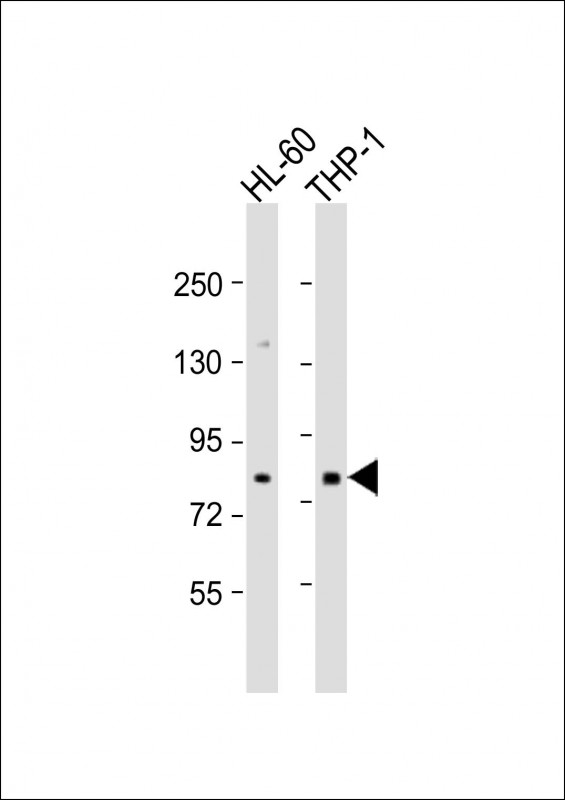

| WB | 1/500-1/1000 | Human,Mouse,Rat |
| IF | 咨询技术 | Human,Mouse,Rat |
| IHC | 咨询技术 | Human,Mouse,Rat |
| ICC | 技术咨询 | Human,Mouse,Rat |
| FCM | 咨询技术 | Human,Mouse,Rat |
| Elisa | 咨询技术 | Human,Mouse,Rat |
| Aliases | Semaphorin-4A, Semaphorin-B, Sema B, SEMA4A, SEMAB, SEMB |
| Entrez GeneID | 64218 |
| WB Predicted band size | 83.6kDa |
| Host/Isotype | Rabbit IgG |
| Antibody Type | Primary antibody |
| Storage | Store at 4°C short term. Aliquot and store at -20°C long term. Avoid freeze/thaw cycles. |
| Species Reactivity | Human, Mouse |
| Immunogen | This SEMA4A antibody is generated from rabbits immunized with a KLH conjugated synthetic peptide between 151-180 amino acids from the N-terminal region of human SEMA4A. |
| Formulation | Purified antibody in PBS with 0.05% sodium azide. |
+ +
以下是关于SEMA4A (N-term)抗体的3篇参考文献,按文献名称、作者和摘要内容简要概括:
---
1. **文献名称**: *Semaphorin 4A promotes tumor progression and regulates immune cell infiltration in lung adenocarcinoma*
**作者**: Li Y, et al.
**摘要**: 该研究通过使用SEMA4A (N-term)抗体进行免疫组化和Western blot分析,揭示了SEMA4A在肺腺癌中高表达并促进肿瘤转移,同时通过调节T细胞浸润影响肿瘤微环境。
---
2. **文献名称**: *SEMA4A enhances vascular permeability and contributes to acute lung injury via Plexin D1 receptor*
**作者**: Smith RJ, et al.
**摘要**: 研究利用SEMA4A (N-term)抗体验证了SEMA4A蛋白在炎症反应中的表达,发现其通过结合Plexin D1受体增加血管通透性,参与急性肺损伤的病理过程。
---
3. **文献名称**: *SEMA4A suppresses glioma progression by modulating neuronal guidance signaling*
**作者**: Wang X, et al.
**摘要**: 通过SEMA4A (N-term)抗体的免疫荧光和流式细胞术,研究发现SEMA4A在胶质瘤中通过调控神经导向信号通路抑制肿瘤增殖和侵袭,提示其作为潜在治疗靶点。
---
如果需要具体DOI或发表年份,可进一步补充数据库检索信息。
The SEMA4A (N-term) antibody is a tool used to detect the N-terminal region of Semaphorin-4A (SEMA4A), a member of the semaphorin protein family. Semaphorins are evolutionarily conserved molecules involved in axonal guidance, immune regulation, angiogenesis, and tumor progression. SEMA4A is a transmembrane glycoprotein characterized by a conserved N-terminal "sema" domain, followed by immunoglobulin-like, transmembrane, and cytoplasmic domains. It interacts with receptors such as Plexin-B1. Plexin-D1. and Tim-2. modulating downstream signaling pathways (e.g., MET, VEGFR2) to regulate cell migration, adhesion, and apoptosis.
SEMA4A plays dual roles in cancer, acting as either a tumor suppressor or promoter depending on context, and is implicated in autoimmune diseases like multiple sclerosis and rheumatoid arthritis. The N-terminal region, containing the sema domain, is critical for receptor binding and functional activity. The SEMA4A (N-term) antibody, often raised in rabbits or mice, is validated for applications like Western blotting, immunohistochemistry, and immunofluorescence to study protein expression, localization, and interactions. Its use has advanced research in neurobiology, oncology, and immunology, particularly in elucidating SEMA4A's role in tumor microenvironment modulation, immune checkpoint regulation, and neural circuit formation. Proper validation ensures specificity, minimizing cross-reactivity with other semaphorin family members.
×